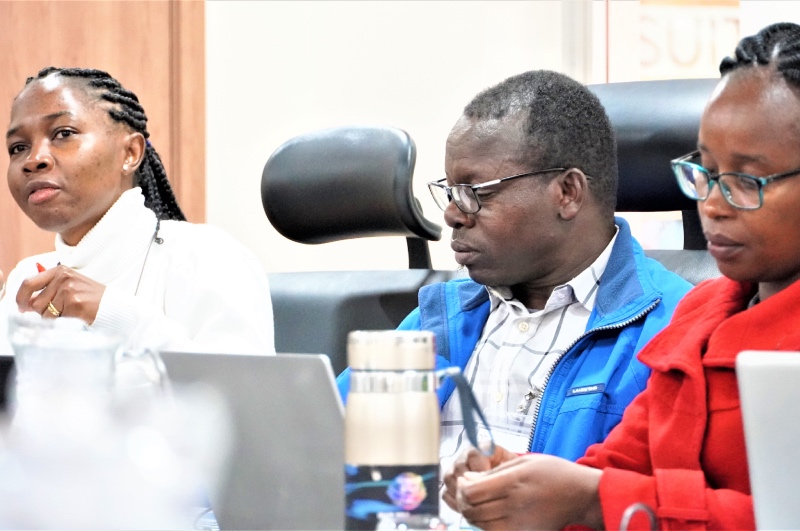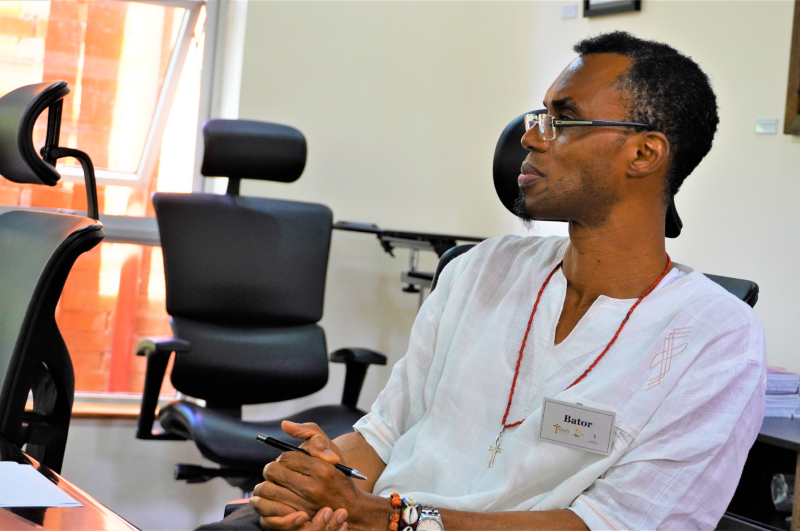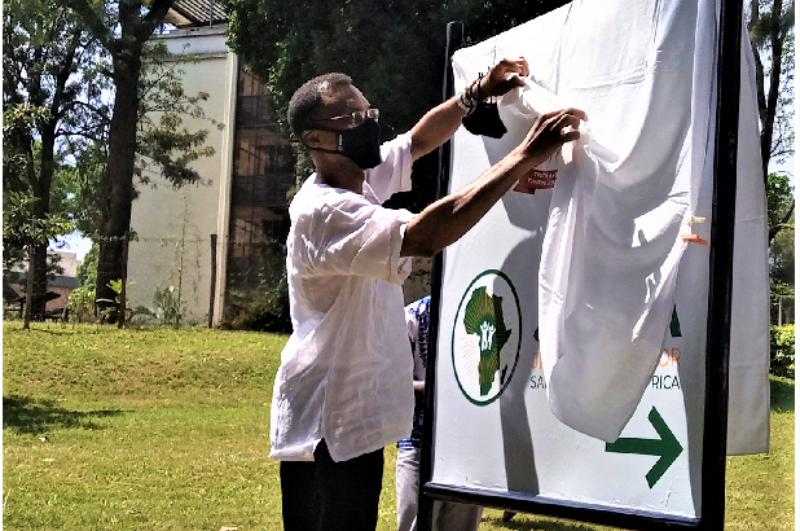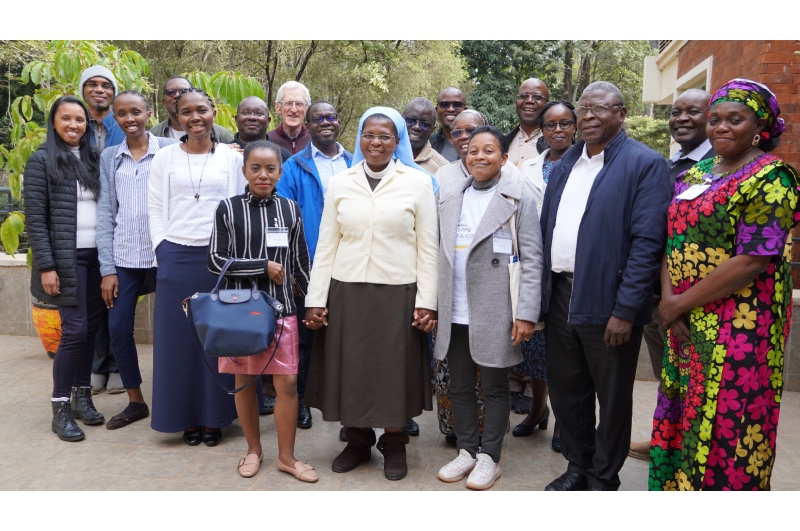

Safeguarding Officers of the Jesuit Conference of Africa and Madagascar (JCAM) gathered in Nairobi, Kenya for their Annual Meeting from 21-23 July, 2023.
The forum was attended by 16 Child Protection Officers from the seven provinces and one region and the formation centres. Over ten CPOs also participated virtually, especially from Madagascar and Zimbabwe.
The Annual Meeting serves two roles: it provides a space for peer learning among the CPOs and provides an opportunity to bring new knowledge from external speakers. This year’s forum was also an opportunity to review safeguarding work 5 years on.
The outgoing JCAM president Fr. Agbonkhianmeghe E. Orobator, SJ opened the meeting with an encouraging speech that highlighted the milestones that JCAM has so far realised since the inception of the safeguarding programme in 2017.
Overall, tremendous growth was observed in the quality and scope of progress reports from the provinces/region. Notably provinces that have long-serving CPOs have managed to entrench safeguarding due to their stability. Furthermore, several recently appointed CPOs who joined the meeting, felt inspired by the reports of the others.
The meeting also had presentations, two from the PCCP project assistant Dr. Sandra Racionero-Plaza on ‘successful action with social impact in preventing abuse’. Also, Fr. Joachim Zoundi, SJ, gave one presentation on ‘The Meta Model of Neuro-Linguistic Programming (NLP) as a means of better communication among CPOs and with the victims of abuse as well as with the Perpetrators’.
Meeting outcomes
1. Need for provinces/region and formation centres to focus on the Society of Jesus Safeguarding Standards.
As a minimum, all the provinces/region, and all the institutions, works, apostolates and communities in Africa and Madagascar should meet the Society of Jesus’ 3 global standards namely:
Standard 1: Policy and Guidelines for Ethical Behaviour and Safe Environments.
Standard 2: Protocols for Dealing with Allegations and Case Management.
Standard 3: Training and Formation for Jesuits and Collaborators.
To do implement this effectively, it is expected of provinces/region (and by extension institutions, works, apostolates and communities).
• To have dedicated Safeguarding personnel.
• The creation of a functional Safeguarding Commissions (these are advisory in nature and their work is distinct from that of CPOs).
• Regular and consistent formation to foster AWAKENING, raise AWARENESS and enable ACTION in regard to promoting a consistent culture of protection.
• Annual planning with clear aims, goals and objectives, budget, and Monitoring, Evaluation and Learning (MEL) for safeguarding work.
JCAM safeguarding coordinator will continue supporting the CPOs with elaboration of policies and protocols as may be needed. A template of a protocol from one province that has offered to share will be sent to the CPOs for adaptation to local context as may be appropriate.
2. Role of the CPOs/Safeguarding Officers
Part of the role of CPOs or Safeguarding Officers is to ensure consistency and accountability for compliance with the three standards.
In addition, CPOs should give feedback to their major superiors, of their work but also call to account – specifically on what the province or region is doing to promote safeguarding, what new levels of investment of personnel and resources are needed, and asking for what is needed to carry out CPO work better and well.
3. Communication
CPOs were encouraged to enhance their communication with JCAM regarding their work as it helps to inform the Conference of what is happening in the Provinces/Region. Similarly, they were encouraged to ask for help where needed even among themselves.
PCCP requested for short videos/brief stories of activities being carried out for sharing on social media. JCAM Safeguarding Coordinator will liase with CPOs to organise for these.4. Continuous learning
Continuous learning was encouraged to be effective as some situations are complex and require good skills. In addition, there is a need to try and learn a variety of creative and innovative approaches to use for different contexts while remaining culturally sensitive. There are also new areas of training such as case management that could be handled in the next annual CPO meeting.
5. Networking
Networking is helpful as provinces/regions/formation centres are in different stages of implementing safeguarding and CPOs can inspire one another. Currently, there is a WhatsApp group where resources and communication on different activities are shared. More resources are also found on the JCAM mobile App available on this link {HERE}
The workshop concluded with a reminder from Fr. Orobator that ‘safeguarding is not a problem to be solved; it is a mystery that calls for engagement, commitment, and conversion. It is about creating a new culture, a habitual way of being human that recognises, honours, protects and respects the dignity and integrity of every human being created in the image and likeness of God. Or, as Fr. Arturo Sosa SJ puts it: “a normal, habitual way of living, relating, working, in which those whom we serve particularly children, always feel respected, safe and loved.” It is about people. We must always be asking “What next?”

Related Articles




Select Payment Method
Pay by bank transfer
If you wish to make a donation by direct bank transfer please contact Fr Paul Hamill SJ treasurer@jesuits.africa. Fr Paul will get in touch with you about the best method of transfer for you and share account details with you. Donations can be one-off gifts or of any frequency; for example, you might wish to become a regular monthly donor of small amounts; that sort of reliable income can allow for very welcome forward planning in the development of the Society’s works in Africa and Madagascar.
Often it is easier to send a donation to an office within your own country and Fr Paul can advise on how that might be done. In some countries this kind of giving can also be recognised for tax relief and the necessary receipts will be issued.



